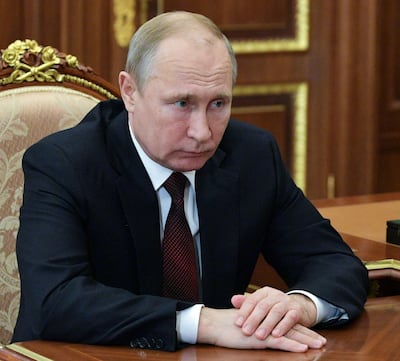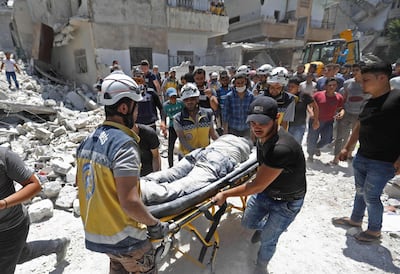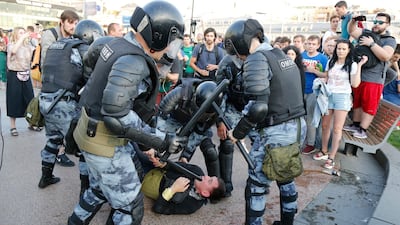In two incidents, in the space of one week, the Kremlin has twice sought confrontation where none was needed.
On Tuesday last week, Russia's fighter jets violated South Korean airspace for several minutes, resulting in a major diplomatic incident as Korean jets fired more than 300 warning shots.
Then, over the weekend in Moscow, thousands of protesters gathered for the second week in a row, sparked by a crude and unnecessary attempt by the municipality to bar independent candidates from the city's council elections.
Police responded forcefully to the protests, arresting thousands, including Russia's most high-profile opposition politician, Alexei Navalny, who was imprisoned before being taken to hospital for exposure to an unidentified chemical.
Both situations could have been avoided. Neither were accidents, either. The Kremlin is actively creating confrontations at home and abroad, hoping to find a role in solving the chaos it is sowing.
This was especially clear in the protests.
The spark for the demonstrations came from an unlikely source – a decision by the country's electoral commission to not allow a series of independent opposition candidates to stand in September's Moscow city elections. Independent registrations for the elections require several thousand signatures, a usually insurmountable obstacle. But, when two dozen opposition candidates managed it, the electoral commission simply refused to register them.
These elections, it should be noted, are not for the city's mayoralty, an important position. Instead, they are for seats on the city council, a much smaller prize.
But, even on something that barely matters, the Kremlin is determined to show its power, and show it in a way that demonstrates overt and public contempt for the election process. It is that sense, that Russia's government is willing to publicly violate the rules, which pushed so many to protest.
That desire to flex the country's muscles was also on show last week.

In a murky incident, Russian planes flew without warning through airspace where Seoul requires foreign aircraft to provide air identification, and then further violated the country's air space. South Korean jets tracked the military aircraft and a volley of warning shots were fired.
On the surface, it seems bizarre to provoke South Korea, a country with which Russia has maintained good relations. However, the East China Sea is heavily contested. It was only last month, after all, that Russian and US warships almost collided in the waters below where the incident took place.
Under Vladimir Putin's two decades of leadership, the role of the Russian state has shrunk. Although he often harks back to the glory days of the Soviet Union, in fact the Russian state today does substantially less for citizens than its predecessor. Most housing is owned by private companies and landlords. The idea that the state would provide the “flat, car and dacha” of Soviet lore is long gone.
Instead, Mr Putin offers security and spectacle. He creates an idea of a world in turmoil, which only his government is able to defend ordinary Russians from, and offers visible displays of the protection he provides.
The intervention in Syria amply demonstrates this. First, the necessity of intervention, of Russia's forces fighting beyond their country's borders to stop a threat to the homeland. Second, the spectacle of a train full of tanks and guns looted from the Syrian battlefield touring the length and breadth of Russia, often accompanied by Soviet war songs.
There is no room for subtlety, either. The train departed from Moscow on a military holiday and returned on May 8, Victory Day in Russia, which commemorates the end of the Soviet war against Nazi Germany.

Mr Putin behaves similarly on a personal level. On the same day as the street protests in Moscow, he was filmed descending in a two-man submarine to the bottom of the Gulf of Finland. In doing so, he projected himself as a strongman politician, able to control the unstable forces of the world by pure brawn and daring.
The Putin state needs these spectacles and this chaos, whether on Russia's streets or beyond them. They demonstrate to a watching world a Russia that is more than a regional power, one that is a global player, able to cause global incidents from Salisbury through Syria, and on to South Korea. They also demonstrate to the Russian public that only the state can keep them safe.
With a weakened economy, poor relations with the West and a war in Syria that drags on without end, the Kremlin is setting up clashes to create a place for itself at home and abroad.
Yet there is a danger in manufacturing conflicts, because they can easily escalate out of hand. Even small skirmishes have the potential to expand unpredictably.
There was, for example, no guarantee that the South Korean incident would have ended peacefully. One miscalculation by either side in the skies above the Korean Peninsula, and there could have been serious consequences.
Meanwhile, in Moscow, Mr Navalny has been taken ill and his doctors believe he could have been poisoned. What started as a minor attempt to exclude candidates from a meaningless election has escalated first into the biggest street protests the Russian capital had seen in years, and the world watching to see whether an opposition politician had been brazenly poisoned in custody.
That is the problem with chaos – once unleashed, it is difficult for anyone, even the Russian state, to bring under control.


